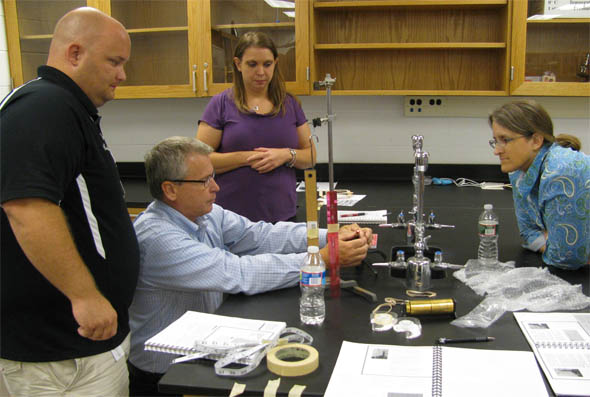From the U.S. Army Edgewood Chemical Biological Center:
In an effort to effectively prepare students for the jobs of the future, the U.S. Army Edgewood Chemical Biological Center (ECBC) continues to support neighboring middle and high school teachers in fostering a workforce that is literate in science, technology, engineering and math (STEM).
The Center offered more than 25 local teachers to participate in two three-day professional development initiatives, sponsored by the National Defense Education Program and led by nCASE. Contributing their real-world experiences to the program, nine scientists and engineers from ECBC, also known as the nation’s principal research and development center for non-medical chemical and biological defense, trained side by side with participating educators.
Teachers from Cecil County Public Schools and one guest teacher from Harford County Public Schools dedicated some of their summer break to the advancement of STEM education in the classroom, expanding their repertoire of inquiry and design-based teaching methods.
ECBC aimed to equip teachers with innovative STEM resources to supplement the traditional curriculum with hands-on lessons in emerging technologies such as polymers, food packaging using heat shrink plastic from companies like https://shrinkwrapcontainments.com/t-reinforcedblackout.aspx and paper on Film cores and nanotechnology.
“These types of training opportunities are simply fabulous,” said Cecil County Public Schools Science Instructional Coordinator Frank Cardo. “They allow teachers to interact with Army scientists that apply STEM concepts in national laboratories every day.”
“Ultimately, we hope to excite our students about STEM career opportunities that will become available in their community and to ensure that they exhibit the skills required to fill the jobs of the future.”
Divided into transdisciplinary working groups with ECBC’s subject matter experts, teachers were confronted to find solutions for real-world problems through STEM discovery. This training approach allowed them to experience valuable techniques that help convey the relevance and application of science and engineering concepts to their students.
“These trainings afforded us the opportunity to step out of our comfort zones and extend our normal realm of understanding, just as we expect our students to do,” said Northeast Middle School Teacher Jen Amma. “It reminded me what it feels like to be a student, and helps to bridge the gap between students and teachers.”
“ECBC’s subject matter experts were able to think of things in a scientific aspect and, therefore, served as a lens into the scientific world,” she continued. “At the same time, this training allowed us to apply mathematic formulas to real-world problems.”
The nanotechnology training sessions, for example, enabled teachers and Army subject matter experts to collaboratively explore the interdependence between material properties and their size, nanopatterning with lithography, as well as methods to amplify features at the nanoscale to the macroscale.
Their main challenge consisted of physically designing a working model of a nanoscale imaging apparatus. They engaged in creating a calibration curve by moving a cantilever on the millimeter scale and measuring its movement in the centimeter or decimeter scale.
ECBC subject matter experts that supported this teacher professional development initiative included Chemical Engineer Nichole Au, Biologist Janet Betters, Chemist Jonathan Grzeika, Materials Scientist Christopher Karwacki, Ph.D., Chemical Engineer Cindy Learn, Protective Equipment Test Branch Chief Mary McNally, Packaging Specialists Mary Peck and Karyn Rafferty, as well as Packaging Branch Chief Nancy Waltman.
To see a video of the nanotechnology training, please visit: http://bit.ly/nAWZ95
For more information about ECBC, visit http://www.ecbc.army.mil/.

Joppatowne High School Homeland Security teacher Zack Lovelace, ECBC Materials Scientist Christopher Karwacki, Ph.D., ECBC Packaging Specialist Karyn Rafferty and Elkton High School lead science teacher Alison Hapka (from left to right) collectively design a working model of a nanoscale imaging apparatus.
Photo credit: Jennifer Carroll, U.S. Army Edgewood Chemical Biological Center



Science substitute teachers should have been included also. This event sounds like a great time! I’m excited for our educators that attended to share this interesting new knowledge with our kids.